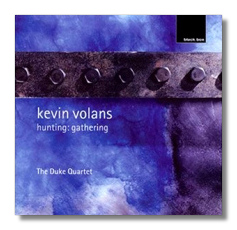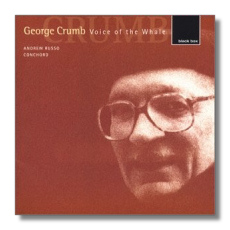
The Internet's Premier Classical Music Source
Related Links
- Crumb Reviews
- Latest Reviews
- More Reviews
-
By Composer
-
Collections
DVD & Blu-ray
Books
Concert Reviews
Articles/Interviews
Software
Audio
Search Amazon
Recommended Links
Site News
 CD Review
CD Review
Chamber Music

Kevin Volans
- String Quartet #1 "White Man Sleeps"
- String Quartet #2 "Hunting:Gathering"
- String Quartet #6
The Duke Quartet
Black Box BBM1069 DDD 73:26


George Crumb
- Makrokosmos I
- A Little Suite for Christmas, A.D. 1979
- Vox Balenae "Voice of the Whale"
Andrew Russo, piano
Conchord
Black Box BBM1076 DDD 74:04
Many musicians have "Europeanized" African music; Paul Simon's Graceland and David Fanshawe's African Sanctus are two highly contrasted examples. Kevin Volans is a composer who, if anything, has tried to Africanize Western music.
Volans was born in South Africa in 1949. His education took him to Cologne, where – in the 1970s - he became a pupil of avant-gardist Karlheinz Stockhausen. In time, Volans found a voice that had little to do with middle-European dogma, however. The sights and sounds of the African continent proved to have an indelible effect on his writing. Around 1980, he began composing what he called a series of "African paraphrases," in which, in his own words, he "hoped, perhaps somewhat naïvely, to reconcile African and European aesthetics." Many South Africans were incensed, but these works built Volans an international reputation. One of the first fruits of this attempt at reconciliation was White Man Sleeps. Originally, it was scored for a Baroque-style original instruments ensemble, but it is steeped in the melodies, rhythms, and timbres of African music. A few years later, the Kronos Quartet asked Volans to reconfigure White Man Sleeps as a string quartet, and it is in this version that the work has become more familiar. The juxtaposition of African materials with European instruments creates something new, not just a pastiche. Now known as his String Quartet #1, White Man Sleeps consists of five dances, but these are not simple, literal transcriptions of African folk tunes. A rhythm from here and a melody from there leads not to a Frankenstein's monster assemblage of disparate parts, but to the creation of a new and radiant being, devoid of sutures and bolts. The Second String Quartet, "Hunting:Gathering," another Kronos commission, was written in 1987. Less edgy than its predecessor, it is even more haunting: the opening minutes of this quartet are not easy to forget. In spite of a collage-like approach to this work (Volans writes, "there are about 23 different pieces of music in the space of 26 minutes, linked together in a pseudo-narrative which leads nowhere in particular"), it is a solid piece of cloth.
In 1988, Volans ceased making direct references to African music in his works. String Quartet #6, written in 2000, is a very different work from the first two quartets. This quartet is an example of Volans's increasing concern with what he calls "strip[ping] music of its content." The composer comments that, while visual art in the Twentieth Century has tended toward simplification, music often has gone in the opposite direction. Even Philip Glass's Minimalist music is often frantically busy. An outcome of Volans's new interest is a 24-minute work that owes more to John Cage and Morton Feldman than to African dances. Stoic, stately, and implacable, the music quietly confronts the listener much like the rocks at Stonehenge and the heads on Easter Island. On the surface, not much seems to be going on, but it is proof of Volans's talent that the listener so quickly becomes fascinated with so little.
The Kronos and Balanescu Quartets have recorded Volans's music. I find the Duke Quartet superior to these two groups, however. Kronos rushes Hunting:Gathering, and neither Quartet goes as deeply into the heart of the music as the Duke Quartet does. They've stripped the veneer of novelty from the surface and demonstrated the true staying power of Volans' vision. Black Box's engineering is superior too. If you're interested in Volans, this is the place to start.
The George Crumb CD also is representative of this composer's work, although it omits orchestral works and Ancient Voices of Children; the latter is work particularly important for the Crumb-curious to explore. Here is a composer who can easily but unfairly be dismissed as a sensationalist. Flutists are asked to sing through their instruments, pianists are asked to whistle and moan, and instrumental scores are visually twisted into circles or cruciforms. The ends justify the means, though: Crumb's music is full of beautiful and unearthly sounds quite unlike anything in the Western classical literature.
Makrokosmos I, a suite written for amplified piano in 1972, is subtitled "Twelve Fantasy-Pieces after the Zodiac." Crumb makes additional associations with the zodiacal signs: there are references to Christianity, the lost Kingdom of Atlantis, and the Aeolian harp for example. The pianist plays the piano traditionally, and he also plays on the bare strings. Fingers are joined by forearms, knuckles, and fingernails in making sound all over the piano. The pianist whistles, speaks, utters nonsense syllables, and ululates into the piano's innards, and the sounds are duly amplified. The result is sometimes silly and dated, but often profound, and no more so than when Crumb is at his most still – musical autism is not without its rewards. A Little Suite for Christmas, A.D. 1979 confirms that Crumb's spirituality is not garden-variety. Fans of Olivier Messiaen will be sympathetic to Crumb's equally idiosyncratic interpretation of Christ's nativity; the chiming chords in the opening "Visitation" could almost be homage. Andrew Russo, a talented young Juilliard graduate, takes it all very seriously, but his playing isn't lacking in ebullience, and his "extramanual" work in Makrokosmos bears no trace of embarrassment. For those who want Makrokosmos and its sequel, Jo Boatright on Music & Arts may be preferred. Lambert Orkis's Bridge recording of A Little Suite contains other important piano music, and is as penetrating as Russo's.
Vox Balaenae is one of Crumb's most recorded works, which is odd, because it has a visual component which, of course, cannot be appreciated on CD. (The three players wear black half-masks, which, according to Crumb, "symbolize the powerful impersonal forces of nature." Crumb also suggests special lighting.) The instruments are flute, cello, and piano, and all three are amplified. It is my impression that Crumb wished to create a nearly terrifying effect in this music, which evokes humpback whales and man's threat to their continued existence. Conchord (flutist Daniel Pailthorpe, cellist Bridget MacRae, and pianist Julian Milford) treat the music with refinement and delicacy - more like Ravel with weird noises - an approach that works surprisingly well, if you don't want to be overawed by Vox Balaenae.
As with the Volans disc, the engineering on the Crumb disc is superb. This is a studio recording, made in 2002 in London's Winterbrook Studios.
Copyright © 2002, Raymond Tuttle


















